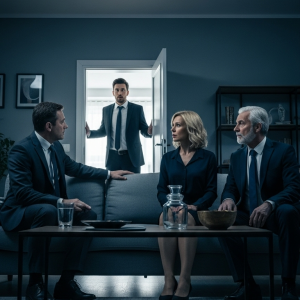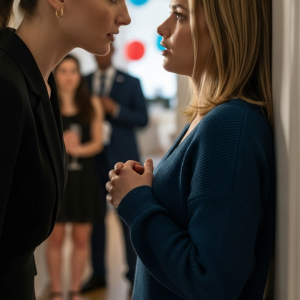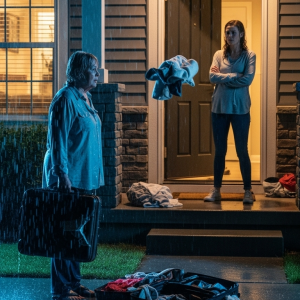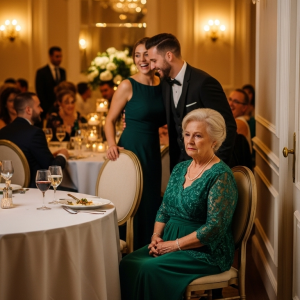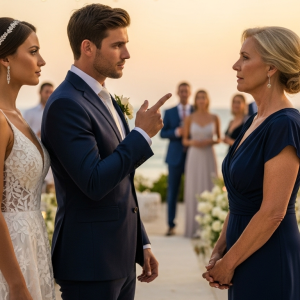I always knew I was the echo in my own family. I’m not saying this in a dramatic, “I was an accident” kind of way. My parents were more direct. They once told me, straight-faced, that they wished they’d only had one child. My twin sister, Sarah, was the one they wanted. I was the unforeseen bonus, a two-for-one deal they never asked for.
Growing up was like living on the wrong side of a one-way mirror. Sarah was the star, and I was the stagehand she never saw. Her room was a pink-and-white confection of Disney bedspreads and shelves overflowing with every toy imaginable. She was the princess; I was the footnote. My room was a cramped afterthought—a tiny space with a creaky bed and a dresser that smelled of mothballs and the 1970s.
Mornings were a daily masterclass in irrelevance. I’d wake to the sound of my parents cooing over Sarah’s gymnastics schedule or planning her next shopping trip. I was a ghost at my own breakfast table. Their attention slid right past me, only landing on me if I was in the way. “Why can’t you be more like your sister?” became my unofficial name.
School offered no escape. At one parent-teacher conference, they spent twenty minutes gushing over Sarah’s finger paintings as if she were the next Picasso. When my teacher presented my report card—filled with the good grades I’d fought for, hoping to finally earn a glance—they didn’t even look at it. They just folded it and put it away. It was then I realized my efforts were pointless. Sarah was the sun; I was just a shadow she cast.
The disparity was everywhere. Her closet was a rotating collection of new outfits for every season. My wardrobe consisted of hand-me-downs from distant cousins, some of the shirts older than I was. Birthdays and Christmases were exercises in forced smiles. Sarah would be buried under a mountain of gifts, while I’d receive one or two token items, just enough for them to claim they hadn’t forgotten me. I’d watch her tear open present after present, the crinkle of wrapping paper sounding like mockery, and pretend it didn’t gut me.
It was never just about the material things. It was the crushing weight of the small things. Sarah’s toys were sacred relics. If I so much as breathed on one of her dolls, she would shriek, and my parents would materialize, their faces thunderous. It was always my fault. I was “careless” or “disrespectful of her space.” At dinner, Sarah always got the first and best of everything—the largest slice of pizza, the juiciest cut of chicken. I got what was left. If I dared complain, my mother’s eyes would narrow. “Be grateful you’re getting anything at all,” she’d hiss, as if feeding me was a reluctant act of charity.
The only person who saw me was my grandfather. He didn’t treat me like I was invisible. Weekends at his place were my only refuge. He’d take me fishing or we’d just sit on his porch while he told me stories. In those few hours, I felt like a person, not a problem.
Then, he got sick. Cancer. Even then, my parents used his illness as another tool of exclusion. They took Sarah to visit him, her arms filled with flowers. I was always told to stay home. The excuse was that they needed help around the house, but the message was clear: I didn’t belong, not even in grief. I’d sneak out to see him on my own. He’d squeeze my hand, his grip weaker each time. “You’re a strong kid,” he’d whisper. “I’m so proud of you.”
When he passed, the one anchor in my life was gone. My parents didn’t ask if I was okay. They were too busy consoling Sarah, as if she were the only one who had lost someone. At the funeral, they stood at the front, Sarah between them. I was relegated to the back, an awkward stranger at my own grandfather’s farewell. I had never felt so profoundly alone.
After my grandfather’s death, what little presence I had in the house evaporated. I became a true ghost, haunting the edges of family photos, my existence reduced to a stray elbow or the back of a head. The resentment festered inside me, a quiet, burning coal. I learned to keep my mouth shut, to blend into the wallpaper, because invisibility was less painful than their dismissive words.
I had just turned sixteen when the final act began. Sarah got pregnant. The father was a nineteen-year-old with a dead-end job and no future. I expected fury, lectures, consequences. Instead, my parents were… thrilled. “Our little girl is growing up!” my mother chirped. “We’re going to be grandparents!” It was surreal. They threw a shotgun wedding so fast it felt like a fever dream.
A few weeks later, the bomb dropped. My mother called me downstairs, wearing a smile that I had learned to dread. “With the baby coming,” she began, her voice sickeningly sweet, “Sarah and her husband will need more space.” I waited, my stomach tightening. “We need your room for the nursery.”
The air left my lungs. My room. It was small, it was pathetic, but it was mine. The only place where I could shut the door on their world. “What am I supposed to do?” I stammered. My mother shrugged, a gesture of casual cruelty. “You’re sixteen. You’re old enough to figure it out. Honestly, you should be grateful we’ve let you stay this long.”
My dad stood behind her, arms crossed, the silent enforcer. “It’s time you start taking responsibility for yourself, son,” he said, as if it was perfectly normal to evict your child for the convenience of his sister.
That night, I packed my few belongings: two bags of clothes, a handful of books, and the small pocket watch my grandfather had given me. I looked at the peeling paint on my bedroom walls one last time. My sanctuary was about to become a shrine for a baby I didn’t know, born to a sister who had everything.
“Where should I go?” I asked them, a final, desperate plea. “We’re sure you’ll figure something out,” my dad said, turning away. “We’re doing this for your sister,” my mother added, her voice firm. “She needs us right now.”
What about me? I wanted to scream. When have you ever needed me?
But the words died in my throat. I did the only thing I could. I grabbed an old tent from the garage and pitched it in the far corner of the backyard. It was all I had. The nights were freezing, the ground unforgiving. I was a stray dog, close enough for them to see, but far enough not to be a bother. Through the kitchen window, I could watch them laugh and plan for the baby’s arrival. They never once looked out into the darkness where I shivered.
Winter arrived, and the cold became a physical entity, seeping into my bones. I did my homework by flashlight, wrapped in three layers of clothing, my fingers too numb to write properly. My grades began to slip. It’s hard to care about algebra when you’re not sure you’ll make it through the night. I was a ghost in their garden, a forgotten secret just feet from their warm, happy home.
One night, listening to the wind whip the thin fabric of the tent, a cold clarity settled over me. They were never coming for me. They had pushed me out without a second thought because I was nothing to them. And in that moment, I made a decision. I was done waiting for their approval. I was done being their ghost. I would find a way out, and I would do it alone.
Desperation is a powerful motivator. I started taking any odd job I could find—mowing lawns, shoveling snow-covered driveways, anything for a few dollars. Most people looked at me like I was a beggar, but a few took pity. Every dollar was a small victory, enough for a sandwich I’d eat alone in my tent.
One afternoon, drawn by the smell of fresh bread, I found myself lingering outside a local bakery. I must have been a sorry sight, because the owner, a gruff old man named Frank, came out. He had a face etched with the kind of lines that come from hard work and no nonsense. “You looking for work, kid?” he grunted, his eyes sizing me up. I nodded, not trusting my voice. “I need someone to sweep, clean, and make deliveries. I’ll pay you cash and you can have whatever’s left at the end of the day.” It felt like being thrown a life raft.
The work was brutal. I was up at 4 a.m., walking to the bakery in the pre-dawn chill. But the moment I stepped inside, the warmth and the smell of yeast and sugar felt like a haven. Frank was a tough boss, but he was fair. He told me stories of how his own father had kicked him out, how he’d built this bakery from nothing. I think he saw a flicker of his own past in me.
After a few weeks, Frank motioned me upstairs. “Got a small storage room up here nobody’s using,” he said, avoiding my eyes. “It’s not much, but it’s got a roof and a bed. You can crash here if you want.”
I moved my things in that night. The room was tiny, but it was warm. It was safe. For the first time in months, I slept without shivering. I threw myself into the work, determined to repay his kindness. I learned to knead dough until my arms ached, to shape the perfect loaf, to master an apple pie. Frank’s version of a compliment was a slight nod or a quiet grunt, but it meant more to me than any praise my parents had ever given.
He became a silent mentor. One day, he sat me down and handed me my first real paycheck. “You’re doing good work, kid,” he said. It wasn’t a fortune, but it felt like one. It was the first tangible proof that I was building something, that my life was moving forward.
Life settled into a new routine: work at dawn, library in the afternoon to hunt for more opportunities, and save every single penny. Frank never asked about my family, but he knew. One night, he handed me a set of keys. “In case you need to lock up,” was all he said, but I understood the real meaning. It was trust. In his own gruff way, Frank was looking out for me.
Sometimes, I’d see families in the bakery, laughing together over pastries, and the old wound would ache. But I’d push it down. Frank’s words would echo in my head: “You either let life beat you down, kid, or you get up and beat it right back.” I was done being beaten down.
Years passed. I worked two, sometimes three jobs. I saved obsessively. And then, I did it. I bought a house. A modest three-bedroom place on the edge of town. Holding the keys in my hand for the first time, standing in the empty living room, I felt a surge of pride so fierce it almost brought me to my knees. I had done it. On my own.
I was just starting to feel settled when the doorbell rang. When I opened it, the past hit me like a physical blow. My parents. Sarah, her husband, and their now three children. All of them, standing on my porch, beaming as if we were long-lost friends. “Surprise!” my mother sang. “We heard you bought a house! We are so proud of you.”
I gripped the doorknob, my knuckles white. Sarah pushed past me, her eyes scanning the entryway. “Nice place, bro. You’ve really done well for yourself.” Then my dad cleared his throat, gearing up for one of his speeches. “Son, we were thinking… with Sarah’s family growing, and you having all this space… maybe it’s time we let bygones be bygones. Family should stick together.”
The audacity was breathtaking. I felt a cold laugh bubble in my chest. “What do you want?” I asked, my voice flat. My mother’s smile was predatory. “Well, we were thinking, wouldn’t it be lovely if we all moved in? One big, happy family. Just like old times.”
The memories flooded back—the cold tent, the hunger, the utter loneliness. And now they wanted to invade the one safe place I had built for myself. “No,” I said, the word a stone in the air between us. “That is not happening.”
The smiles vanished. “But we’re your family!” my mother insisted. “We should help each other!” “Help each other?” My voice started to rise, shaking with years of suppressed rage. “Where was that attitude when I was sixteen, sleeping in your backyard? Where was my family then?”
Silence. My dad’s face flushed a deep, angry red. “Now, you listen here—” “No, you listen,” I cut him off, stepping forward. “I built this. I worked for every single nail in this house while you were living your perfect life. This is my home. And you are not welcome in it.”
Sarah’s face crumpled into a mask of fake hurt. “Don’t be so selfish. We need this space. You owe us.” That was it. The final straw. “Owe you?” I snarled. “I don’t owe you anything. You threw me out like garbage. Now get out of my house.”
They stared at me, truly seeing me for the first time—not as the quiet, broken boy, but as a man who would not bend. They turned and left without another word. As I watched their car drive away, I felt a strange cocktail of anger, sadness, and profound relief. I had finally stood up for myself. I shut the door, leaned against it, and for the first time in my life, I felt truly free.
I was wrong to think a closed door would be the end of it. Toxic people don’t just walk away; they find new ways to break in. A few weeks later, a certified letter arrived. A legal notice. My sister was contesting my ownership of the house, claiming it was “family property” that should be shared.
My lawyer, a sharp woman named Karen, was blunt. “They don’t have a legal leg to stand on, but they’re going to make your life a living nightmare.” She was right. They dragged my name through the mud, telling anyone who would listen that I was an ungrateful son who had taken advantage of their generosity. Old family friends called, scolding me. “Why can’t you just let your family in?” they’d ask. The narrative was set: I was the villain.
But I wasn’t that kid anymore. I fought back. I provided my lawyer with years of bank statements, pay stubs—every piece of paper that proved my journey. Then, on a hunch, I asked her to do something more. I asked her to dig into my parents’ financial history, specifically around the time of my grandfather’s death.
A week later, she called me into her office. The look on her face was grim. “You need to see this,” she said, pushing a thick file across the desk.
What I read changed everything. My grandfather, the only person who ever truly loved me, had left me a substantial inheritance. It was meant for me when I turned eighteen. But my parents had found a legal loophole. They had gained control of the trust.
Page after page detailed their betrayal. They had used my money to pay off their debts. They had funded Sarah’s wedding. They had paid for her husband’s string of failed businesses. They had siphoned my future to build their perfect present, all while I shivered in a tent just yards away.
The documents shook in my hands. The anger was a white-hot fire in my chest. All those years of struggle, of working my fingers to the bone, they had been living comfortably on what was rightfully mine. It wasn’t just money they had stolen. They had stolen my sense of worth, making me believe I was the problem when, in reality, I was their secret source of income.
“They want your house?” Karen said, her voice laced with steel. “Fine. We’re going to take back everything they stole from you.”
It was no longer just about the house. It was about justice.
When my parents were served with the countersuit, their world imploded. My phone blew up with frantic, tearful voicemails. They wanted to talk. Of course they did. Now that they were caught. I ignored them all.
The court battle was brutal. They tried to paint me as a vindictive son, but the evidence was irrefutable. With every lie they told on the stand, my lawyer would present another bank statement, another withdrawal, another receipt that proved their fraud. It was agonizing to watch, but for the first time, I felt powerful. I was no longer their victim.
The day the verdict came, the courtroom was silent. The judge ruled entirely in my favor. My parents were ordered to pay back every cent they had taken, plus damages. The color drained from their faces. For the first time in their lives, they couldn’t talk their way out of the consequences.
Leaving the courthouse, I felt a profound sense of closure. It wasn’t about the victory or the money. It was about reclaiming my story. I had proven, not just to the court but to myself, that I was not the worthless person they had made me feel I was.
They’ve tried to reach out since, with hollow apologies and pleas for forgiveness. I’ve blocked their numbers. Apologies only offered under duress are not apologies at all; they are merely attempts at damage control.
Now, my life is my own. It is quiet. It is peaceful. It is built from scratch, by my own two hands. Family, I’ve learned, isn’t about blood. It’s about who shows up for you when you have nothing, not who shows up when you have something they want. I don’t know what the future holds, but I know I will face it on my own terms. I am no one’s ghost anymore.
